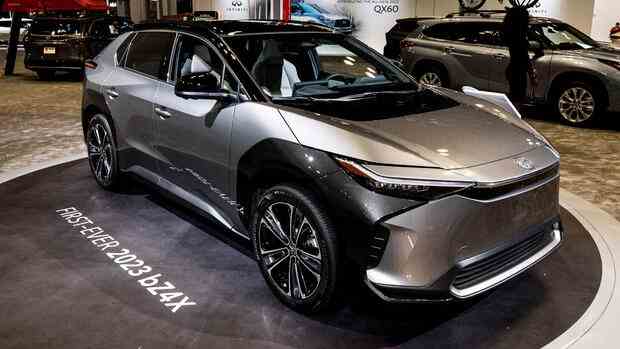Brussels Toyota wants to launch its first purely battery-powered electric car on the European market in the second attempt. The mid-range SUV “bZ4X” is now to be delivered to the European dealers of the Japanese automobile group in the first quarter of 2023. Five more electric models are to follow by 2026.
The “bZ4X” was originally supposed to be available at European Toyota dealerships this summer. But unexpected quality problems threw a spanner in the works for Toyota when planning the model: the wheels came loose on some of the new electric models. Toyota then stopped the planned start of sales. After additional tests, the group decided to use new wheel bolts.
This should now solve the technical problems with the wheels. The breakdown was unusual for Toyota, the Japanese manufacturer is actually known in the automotive industry for the particularly high vehicle quality.
Toyota Europe boss Matt Harrison is convinced that the new electric model will sell well and that the wheel problems will soon be forgotten. “We will probably not be able to meet the demand for the vehicle next year,” said Harrison in Brussels in an interview with the Handelsblatt.
Top jobs of the day
Find the best jobs now and
be notified by email.
Due to the high demand, delivery times of one year and more for purely battery-electric cars are now the norm. At Toyota, there is also the fact that the group has taken more time than most of its competitors to develop battery models.
According to Toyota’s current plan, by 2030 35 percent of the cars it sells worldwide will be purely battery-powered vehicles (“BEV”). The VW Group is already calculating with an electric share of around 50 percent for the same year.
The Toyota electric model at the Thailand International Motor Expo in Nonthaburi in late November.
(Photo: IMAGO/ZUMA Wire)
Toyota’s European boss Harrison does not expect a strong sales boost for electric vehicles on the European car market until the second half of the current decade. First the factories for the battery cells would have to be built and the necessary supply of raw materials, such as lithium, would have to be secured.
Six new e-models from Toyota by 2026
In Europe, Toyota therefore expects a comparatively low BEV share of around ten percent for 2025. Harrison announced that by 2030 this would then become 50 percent. The VW Group is also faster on the European market: by 2030, the Volkswagen passenger car brand should achieve an electric sales share of around 70 percent.
By 2026, Toyota plans to launch a total of six electric BZ models on the European market. The mid-size SUV “bZ4X” is based on the size of the ID.4 from Volkswagen, later smaller and larger “bZ” models will be added. At the end of next year, the Japanese group could launch the first smaller model, the “bZ3”. Toyota’s numbering of the electric models has so far corresponded to that of Volkswagen’s ID series.
Financial circles have doubts about Toyota’s electric car strategy
In financial circles there are doubts about the electric strategy of the world’s largest car manufacturer. “So far, Toyota’s electric progress has been very slow,” says auto analyst Eunice Lee. Other automakers are much more advanced with their electric range: “Toyota threatens to lose market share if the speed does not continue to increase.”
Toyota has still not presented a clear model range. Auto analyst Eunice Lee
In China, where demand for BEVs is growing particularly strongly, the Toyota premium brand Lexus is already suffering the first market share losses, Lee continues. The same pattern can be observed in California, where the Toyota brand is losing shares. In the most populous state in the USA, the demand for electric cars is particularly high, as it is in China. “Toyota still hasn’t presented a clear model program,” criticizes Lee.
Toyota pursues a technology-open approach
European boss Harrison, on the other hand, sees no gaps in Toyota’s product strategy and refers to other electric cars in the Japanese group’s model range: plug-in hybrids, simple hybrids and hydrogen-powered fuel cell cars.
Toyota offers every customer in every sales market the drive variant that is currently needed. “We leave no one behind in propulsion,” Harrison said. He considers simple hybrids with their significantly smaller batteries to be the right answer to the problems to be expected when setting up the new battery cell plants for fully electric vehicles. Today it is still completely unclear whether there are enough raw materials available for production in the new cell factories.
>> Read here, how Toyota wants to score with the new Prius in hybrids
Toyota refers to its own hybrid model, the Prius, which has been sold for about 25 years. The Japanese manufacturer has so far been able to sell around 20 million copies around the world, and around four million in Europe. The Prius models have ensured that CO2 pollution has fallen by 160 million tons worldwide. According to Toyota, 5.5 million purely battery electric vehicles would have had to be sold for the same amount.
Fuel cell: Toyota wants to continue offering hydrogen cars
Despite low sales success, Toyota wants to continue to offer fuel cell cars. “We see an increasing interest. This is particularly true for Germany, where the question of energy independence has become increasingly important due to recent developments,” emphasized Harrison, head of Europe. If a hydrogen infrastructure for trucks, ships and planes has been set up, there could also be enough hydrogen for cars. So far, Toyota has only offered a hydrogen model with the Mirai.
Harrison announced that Toyota’s European subsidiary, including production in its own plants, wants to become climate-neutral by 2040. Toyota does not want to achieve this goal worldwide until 2050.
More: After three years of crisis: car importers are hoping for a turnaround in the German market
